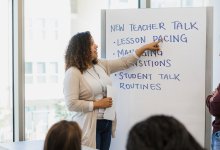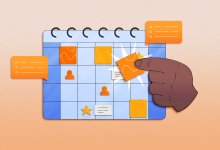- Administration & Leadership
Strengthening Students’ Foundational Math Skills in Middle School
If many students are struggling with operations like dividing decimals, this schoolwide approach to scheduling can help.Your content has been saved!
Go to My Saved Content. - Classroom Management
How to Create a Values-Aligned Classroom
Teachers can collaborate with students to identify shared values that establish a foundation of respect and a positive learning environment.Your content has been saved!
Go to My Saved Content. - Social & Emotional Learning (SEL)
Modeling Calm for Preschool Students
Teachers can focus on promoting a sense of emotional safety to help students develop self-regulation and resilience.Your content has been saved!
Go to My Saved Content. - Brain-Based Learning
5 Ways to Help Students Reset Their Thinking
When students hit cognitive roadblocks, these strategies will help them pause, rethink their approach, and reengage with their learning process.Your content has been saved!
Go to My Saved Content. - Formative Assessment
Using Interviews to Gain Insight Into Students’ Math Thinking
Elementary teachers can talk with students one-on-one to probe their thinking and learn things that might be missed with traditional assessments.365Your content has been saved!
Go to My Saved Content. - Student Engagement
Simple Swaps for Moving From Passive to Active Learning
These tips demonstrate that planning for active learning experiences doesn’t have to be time-intensive or difficult.329Your content has been saved!
Go to My Saved Content. - Technology Integration
A Virtual Collaboration Project Centered on American Democracy
In a program sponsored by the Smithsonian, students in two different parts of the country interact to explore a civics question that is meaningful to both groups.220Your content has been saved!
Go to My Saved Content. - Game-Based Learning
Using Choice Boxes to Enhance Student Engagement
Providing upper elementary students with choices can help teachers differentiate through learning experiences that feel fun. - Project-Based Learning (PBL)
Problem-Based Learning and Future-Ready Skills
Well-designed projects help students build valuable skills such as collaboration, critical thinking, and communication.1.1kYour content has been saved!
Go to My Saved Content. - Career & Technical Education
How High School Students Can Benefit From Using LinkedIn
It’s to students’ advantage to begin thinking about their future career plans, and the platform can help guide that planning.568Your content has been saved!
Go to My Saved Content.
Popular
- Research
The 10 Most Significant Education Studies of 2025
We’re back with our roundup of the most insightful studies of the year, from the power of brain breaks to groundbreaking research on AI, cell phones, and handwriting in the classroom. - Student Engagement
3 Ways to Prime Students’ Brains for Achievement
Using priming language is a powerful way to set the stage for learning, and we’ve got a free downloadable word bank here to help you implement this research-backed strategy. - Student Engagement
5 Ways to Encourage Deep Mathematical Thinking
You can adapt the curriculum you have to create rich tasks that invite reasoning and build students’ problem-solving skills.35.9kYour content has been saved!
Go to My Saved Content. - Technology Integration
3 Simple Slide Tips That Deepen Learning—and Save Time
Whether you use Google Slides or something else, you can promote deep thinking during presentations by tweaking the slides you already have.15.5kYour content has been saved!
Go to My Saved Content. - Media Literacy
5 Ways to Build Critical Literacy in the Age of AI
With so much information—and misinformation—coming at them every day, students need to learn how to verify truth.
- Social & Emotional Learning (SEL)
Strategies to Help Students Transition Into the Week
Teachers can intentionally plan their Mondays to create classrooms that students feel drawn back into, not pressured by.1.8kYour content has been saved!
Go to My Saved Content. - Administration & Leadership
Connecting School Values and Student Well-Being
Aligning your social and emotional learning curriculum with a clear set of values helps students see the relevance and importance of those lessons.1.4kYour content has been saved!
Go to My Saved Content. - Technology Integration
How to Create Effective 15-Minute SEL Activities
Teachers can use a variety of tech tools to create short social emotional learning activities that fit easily into the classroom routine.1.5kYour content has been saved!
Go to My Saved Content. - Social & Emotional Learning (SEL)
Using Mythology to Ground Social and Emotional Learning
Teachers can leverage students’ interest in Greek mythology to explore emotions and topics like overcoming obstacles.2.3kYour content has been saved!
Go to My Saved Content. - Collaborative Learning
Manager, Facilitator, Motivator, Advocate: Setting Up Group Roles That Really Work
Designating a meaningful role for each group member helps students reach their potential both individually and collectively.
- Administration & Leadership
How to Create a Thriving Drop-In Culture
With deliberate planning and a low-stakes approach, peer drop-in initiatives offer inspiring, expert professional development without leaving the school building.2.1kYour content has been saved!
Go to My Saved Content. - Administration & Leadership
Why ‘Use Your People’ Is a Key Lesson for Principals
Principals often start out in the role trying to do everything themselves, but learning to delegate is a must—both for themselves and for their schools.3.6kYour content has been saved!
Go to My Saved Content. - Professional Learning
The Power of Microlearning in Professional Learning Communities
School leaders can set up professional development in manageable chunks to help maximize teachers’ growth.4.7kYour content has been saved!
Go to My Saved Content. - Administration & Leadership
How Administrators and Veteran Educators Can Team Up to Mentor New Teachers
School leaders can support their new teachers by setting up a structured series of discussions and classroom observation sessions.4.3kYour content has been saved!
Go to My Saved Content. - Professional Learning
How You Can Use Writing to Shape Your Teaching Practice
Teachers can explore different modes of writing to facilitate personal reflection and meaningful connections with other educators.
- Administration & Leadership
Addressing Chronic Absenteeism in Elementary School
School leaders can put a variety of measures in place to ensure that students feel safe, supported, and capable of learning.1.1kYour content has been saved!
Go to My Saved Content. - Administration & Leadership
3 Ways to Support Career-Focused Learning in High School
Linking concepts from the classroom to practical applications in career fields boosts engagement and helps students plan for their future.853Your content has been saved!
Go to My Saved Content. - Administration & Leadership
How Administrators Can Manage Priorities and Reclaim Their Time
Principals should spend most of their time on high-impact tasks that make a difference in teaching and learning.1.6kYour content has been saved!
Go to My Saved Content. - Administration & Leadership
Creating a Weekly MAP to Guide Your Work as a Principal
This strategic plan for assessing and addressing high-priority tasks can help you and your leadership team make meaningful progress.4.2kYour content has been saved!
Go to My Saved Content. - Administration & Leadership
Centering Teacher Collaboration in the Professional Growth Process
Administrators can support effective professional learning by trusting teachers and giving them the tools to guide their improvement.891Your content has been saved!
Go to My Saved Content.





























